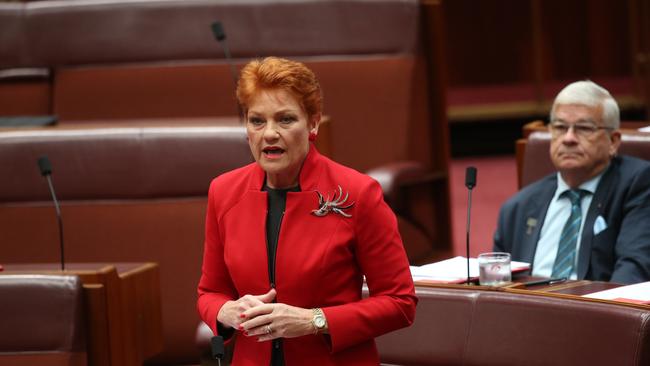Minor parties to hang around in Senate
New analysis reveals contentious Senate voting reforms have not stopped a growing number of voters preferencing candidates outside the major parties.

Minor party candidates will continue to win Senate seats at future elections, especially in smaller states like South Australia and Tasmania, but there will be fewer of them than the record number of crossbenchers in the current parliament.
New analysis from the Parliamentary Library reveals contentious Senate voting reforms introduced in 2016 before the double-dissolution election did not stop a growing number of voters give their first preferences to candidates outside the major parties.
But many voters who preferenced an independent candidate first then gave their second and their preferences to a Labor or Coalition candidate.
The voting reforms, which were put forward by the Turnbull government and supported by the Greens and former senator Nick Xenophon, scrapped group voting tickets and made it all but impossible for micro party candidates to get elected to the Senate through preference deals on a minuscule primary vote.
Former Family First senator Bob Day, supported by Liberal Democrat David Leyonhjelm, lodged an unsuccessful High Court challenge against the reforms, arguing they would effectively eliminate independents.
While the analysis finds the success of small parties in 2016 was largely because the quota needed to gain a seat was substantially reduced at the DD election, it suggests a number of independents would still have been elected in a normal half-Senate election under the changes.
One Nation would have gained a single senator, Tasmanian Jacqui Lambie would have kept her seat, Mr Xenophon would have picked up two Senate seats, the Greens would have won three, but Victorian Derryn Hinch would never have been elected and Senator Leyonhjelm would have lost his seat.
“The (results) for One Nation, the Nick Xenophon Team and the Jacqui Lambie Network — whereby they still have senators under the new system — suggest that the reform is not inherently hostile to small parties; and that if small parties have significant public support, they can gain a presence in the Senate,” the library report, written by Damon Muller in the politics and public administration section, states.
“In general, the 2016 Senate election (albeit with a reduced quota) demonstrated that small parties with reasonable first preference votes and strong preference flows can gain seats in the Senate — even in the absence of group voting tickets, and particularly in smaller electorates such as Tasmania and South Australia.”
In the absence of preference deals, however, the analysis states single-issue parties or those with an “appealing or provocative party name” will “rarely gain sufficient votes or preferences to be elected” and will “not be able to reliably direct their preferences”.
“Parties that have a specific constituency — such as those who appeal to certain religious groups, for example Australian Christians or Christian Democrats — may choose to merge rather than risk splitting their vote between multiple parties,” the research states.
“This is not to suggest that small or single-issue parties will disappear, but rather that the removal of some of the incentives for the creation of these parties should lead to fewer of them appearing on the ballot paper in the future — particularly at a normal half-Senate election.”
Parliamentary Library analysis conducted before the 2016 election found the double-dissolution would not wipe out the “dysfunctional” Senate crossbench, and accurately predicted Mr Xenophon would pick up three seats and Senator Leyonhjelm and Mr Day would retain theirs.
There are 12 Senate crossbenchers in the 45th parliament, though Ms Lambie was disqualified by the High Court for being a British citizen and has not yet been replaced.



